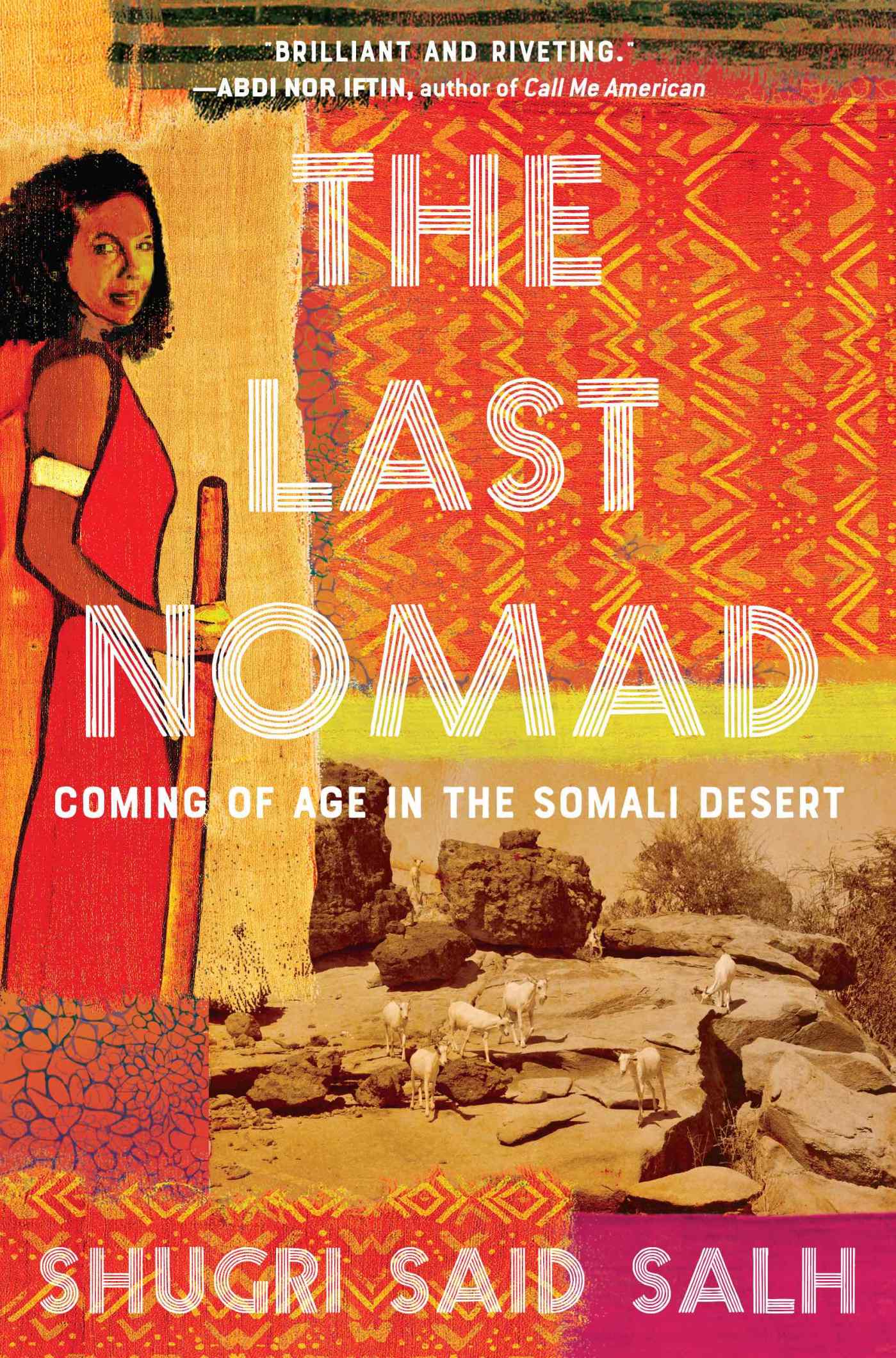For the last several years, I’ve had a particular interest in Somalia. It started with the singer K’naan and continued with Representative Ilhan Omar, yet I wanted to get to know other Somali people and their stories, too. I was excited to learn about The Last Nomad: Coming of Age in the Somali Desert by Shugri Said Salh. This memoir offers another perspective in Somalia and, later, immigrating to North America.
Review
The Last Nomad: Coming of Age in the Somali Desert is such a different memoir than any I’ve read before, both because of Shugri Said Salh’s unique life experiences and because of her engaging, storytelling delivery. This is an eye-opening memoir, but also a fun one. Throughout this book, she describes continuously adapting to new environments—first the Somali desert, then an orphanage, then a Kenyan refugee camp, and finally Canada—and in all cases, she took on the challenge with bravery and optimism.
When Salh was six years old, her family sent her to live in the desert with her nomadic grandmother. I loved learning about her nomadic lifestyle as a child. It’s so different than anything I’ve experienced! She recounts the fun of exploring her world each day and encountering a variety of animals both wild and domesticated. However, she also faced dangers, from droughts to enemy clans.
I enjoyed learning about Salh’s family and culture, even with the ups and downs of both. She describes her joys vividly, but she also doesn’t shy away from the harder topics. One of the most difficult here is the forced female genital mutilation she endured. While it’s looked at with horror in the Western world, it’s a part of the culture she grew up in. Salh discusses it frankly and with a feminist lens here.
Salh later tells of being sent to an orphanage with her younger siblings when she was nine… even though their dad was still alive. For several years in the 1980s, she and her siblings experienced a very different lifestyle there, then in 1988, had to adapt again in moving to Mogadishu, the capital of Somalia. Later, relocating to a refugee camp in Kenya in 1991 was another environment Salh had to adjust to. She describes the Somali Civil War and her own perspective on it, colored as it was by her youth at the time it broke out. Even in such dark times, she paints the story with some lightness, such as noting the differences in dialects between people at the refugee camp. For example, the words for “brother” and “sister” in her dialect are exactly switched in another, so they called boys “sister” and girls “brother”—how confusing!
Her last transition was in moving from Eastern Africa to an entirely new culture: Canada. Though it was a hard time for her, Salh is again able to find the humor in her culture shock in first arriving in Ottawa in the winter. For a woman who had never owned a sweater, and whose language doesn’t even have a word for “snow,” this was quite the change indeed! Learning English and getting an education were further struggles, especially given the different cultural expectations between her Somali family and their new Canadian home.
Throughout The Last Nomad, darkness and lightness are shown unflinchingly, often with humor and verve. I love Salh’s energy and writing style and how she weaves Somali culture throughout the memoir. Tying it all together is the inclusion of Somali proverbs at the beginning of each chapter, written in both Somali and English. It adds to the immersive experience of reading this inspiring memoir.
Final Thoughts
The Last Nomad: Coming of Age in the Somali Desert is a wonderful read, at once energetic and engrossing, even as it shows hardship and the whiplash of changing surroundings. It’s about Somali culture and nomadic culture, but it’s also about adaptability and honoring your roots while embracing your new environment. This is a book I will recommend to everyone, and I look forward to reading more from Shugri Said Salh.
Get the Book
You can buy The Last Nomad here – it’s available as a hardcover, paperback, ebook, and audiobook.
| The Last Nomad: Coming of Age in the Somali Desert by Shugri Said Salh | |
|---|---|
| Audience | Adult |
| Genre | Memoir |
| Setting | Somalia; Kenya; Canda |
| Number of Pages | 293 |
| Format I Read | Hardcover |
| Original Publication Date | 2021 |
Official Summary
A remarkable and inspiring true story that “stuns with raw beauty” about one woman’s resilience, her courageous journey to America, and her family’s lost way of life.
Finalist for the 2022 Dayton Literary Peace Prize Nonfiction Award
Winner of the 2022 Gold Nautilus Award, Multicultural & Indigenous Category
Born in Somalia, a spare daughter in a large family, Shugri Said Salh was sent at age six to live with her nomadic grandmother in the desert. The last of her family to learn this once-common way of life, Salh found herself chasing warthogs, climbing termite hills, herding goats, and moving constantly in search of water and grazing lands with her nomadic family. For Salh, though the desert was a harsh place threatened by drought, predators, and enemy clans, it also held beauty, innovation, centuries of tradition, and a way for a young Sufi girl to learn courage and independence from a fearless group of relatives. Salh grew to love the freedom of roaming with her animals and the powerful feeling of community found in nomadic rituals and the oral storytelling of her ancestors.
As she came of age, though, both she and her beloved Somalia were forced to confront change, violence, and instability. Salh writes with engaging frankness and a fierce feminism of trying to break free of the patriarchal beliefs of her culture, of her forced female genital mutilation, of the loss of her mother, and of her growing need for independence. Taken from the desert by her strict father and then displaced along with millions of others by the Somali Civil War, Salh fled first to a refugee camp on the Kenyan border and ultimately to North America to learn yet another way of life.
Readers will fall in love with Salh on the page as she tells her inspiring story about leaving Africa, learning English, finding love, and embracing a new horizon for herself and her family. Honest and tender, The Last Nomad is a riveting coming-of-age story of resilience, survival, and the shifting definitions of home.
About the Author

Shugri Said Salh was born in the Somali desert. In 1992, she immigrated to North America after civil war broke out in her home country. She attended nursing school at Pacific Union College and graduated with honors. Although this is her first book, Salh has been storytelling since she could talk. From her grandmother and the nomadic community in which she was raised, she heard stories and learned of their power to entertain, teach, and transform. When she isn’t writing or telling stories, she works as an infusion nurse. She lives in Sonoma County with her husband and three children.
More Memoirs
This is What America Looks Like: My Journey From Refugee to Congresswoman
In November 2018, I was thrilled when progressives like Ilhan Omar and Alexandria Ocasio-Cortez were elected to the U.S. House of Representatives. I’ve continued to…
Born a Crime: Stories from a South African Childhood
Two years ago, my mother gave me a Kindle, thinking it would help with my book obsession. While I haven’t slowed down with procuring physical…
North to Paradise
I don’t often read memoirs, especially by people I’m not already familiar with, but I was immediately drawn to Ousman Umar’s North to Paradise. In…
Discover more from Amanda's Book Corner
Subscribe to get the latest posts to your email.





